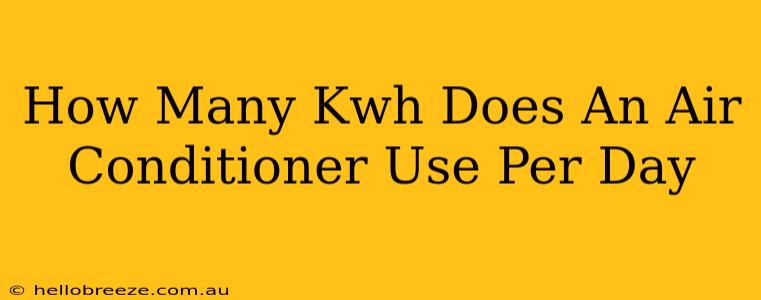Summer heat can be brutal, and your air conditioner is your best friend during those sweltering days. But with rising energy costs, understanding how much electricity your AC consumes is crucial for budgeting and making informed choices about energy efficiency. So, how many kWh does an air conditioner use per day? The answer isn't a simple number; it depends on several factors. Let's dive in!
Factors Affecting Daily kWh Usage
The daily kilowatt-hour (kWh) consumption of your air conditioner isn't fixed. Several factors influence this:
1. Size and Type of Air Conditioner:
- BTU Rating: The British Thermal Unit (BTU) rating indicates the cooling capacity of your AC. Higher BTU ratings mean more powerful cooling, leading to higher energy consumption. A larger home or a poorly insulated space will require a higher BTU unit, resulting in greater kWh usage.
- AC Type: Different AC types have varying energy efficiencies. Window units generally consume less energy than central air conditioning systems. Inverter ACs are known for their energy efficiency due to their variable-speed compressors, consuming less kWh compared to older, fixed-speed models.
2. Usage Patterns:
- Hours of Operation: The longer your AC runs, the more energy it consumes. Running it continuously on a hot day will significantly increase your daily kWh usage compared to running it intermittently.
- Temperature Setting: Setting your thermostat to a lower temperature demands more cooling power, thus increasing kWh consumption. Even a small difference in temperature setting can impact energy usage.
3. Environmental Factors:
- Outside Temperature: Higher outside temperatures require your AC to work harder, leading to increased energy consumption.
- Insulation and Window Efficiency: A well-insulated home with energy-efficient windows reduces the workload on your AC, lowering daily kWh usage. Leaks and poor insulation force your AC to work harder to maintain the desired temperature.
- Sunlight: Direct sunlight heating your home increases the cooling demand, impacting your AC's energy use.
4. Maintenance and Efficiency:
- Regular Maintenance: Dirty air filters restrict airflow, forcing your AC to work harder and consume more energy. Regular cleaning and maintenance, including checking refrigerant levels, ensures optimal performance and energy efficiency.
- Energy Star Rating: Look for the Energy Star rating when buying a new AC. Energy Star certified units are designed to use significantly less energy than standard models.
Estimating Your Air Conditioner's Daily kWh Usage
While pinpointing the exact kWh consumption without a smart meter is difficult, you can estimate. Here's a rough guide:
- Small Window Unit (5,000-8,000 BTU): Might use 1-3 kWh per day on moderate days, potentially more on hotter days.
- Larger Window Unit or Central AC (12,000-24,000 BTU): Could consume 4-10 kWh or more per day, depending on the factors mentioned above.
Note: These are rough estimates. To get a more precise measurement, consider installing a smart power meter that tracks energy usage for individual appliances.
Tips for Reducing Air Conditioner Energy Consumption
Here are some practical ways to lower your AC's daily energy consumption:
- Programmable Thermostat: Utilize a programmable thermostat to optimize cooling during your absence.
- Proper Insulation and Sealing: Invest in proper insulation and seal any air leaks to prevent heat from entering your home.
- Energy-Efficient Windows: Replace old windows with energy-efficient options.
- Regular Maintenance: Clean your air filters regularly and schedule professional maintenance.
- Strategic Shade: Plant trees or use window coverings to reduce direct sunlight.
By understanding the factors impacting your air conditioner's energy use and adopting energy-saving practices, you can lower your energy bills and reduce your carbon footprint. Remember, responsible energy consumption benefits both your wallet and the environment.

